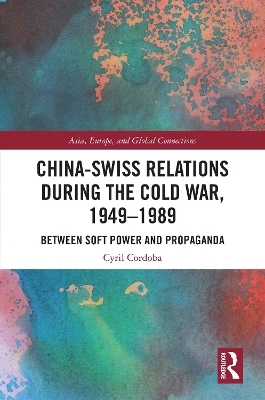
China-Swiss Relations during the Cold War, 1949–1989
Between Soft Power and Propaganda
Seiten
2022
Routledge (Verlag)
978-1-032-11181-0 (ISBN)
Routledge (Verlag)
978-1-032-11181-0 (ISBN)
During the Cold War, Switzerland functioned as a hub for Chinese propaganda networks. Focusing on cultural diplomacy and questioning the notion of soft power, this book explores how the People’s Republic of China (PRC) developed its influence and its prestige abroad through its Embassy in Bern, the most important in Western Europe.
During the Cold War, Switzerland functioned as a hub for Chinese propaganda networks. Despite its fierce anti-communism, the Swiss Confederation was one of the first capitalist countries to recognise the People's Republic of China (PRC). As a neutral country and as the home base for many international organisations, Switzerland represented a strategic centre for the spread of Maoism throughout the world. Focusing on cultural diplomacy and questioning the notion of soft power, this book explores how the PRC developed its influence and its prestige abroad through its Embassy in Bern, the most important in Western Europe. The book also discusses how China’s approach in Switzerland, bypassing traditional diplomatic structures, and relying on contacts with individual people – "foreign friends" – was then used, and continues to be used, in many other countries, including the United States, France, and Japan.
During the Cold War, Switzerland functioned as a hub for Chinese propaganda networks. Despite its fierce anti-communism, the Swiss Confederation was one of the first capitalist countries to recognise the People's Republic of China (PRC). As a neutral country and as the home base for many international organisations, Switzerland represented a strategic centre for the spread of Maoism throughout the world. Focusing on cultural diplomacy and questioning the notion of soft power, this book explores how the PRC developed its influence and its prestige abroad through its Embassy in Bern, the most important in Western Europe. The book also discusses how China’s approach in Switzerland, bypassing traditional diplomatic structures, and relying on contacts with individual people – "foreign friends" – was then used, and continues to be used, in many other countries, including the United States, France, and Japan.
Cyril Cordoba is an historian (PhD). He is currently a post-doctoral researcher teaching at the Department of Contemporary History of the University of Fribourg and at UniDistance, Switzerland.
Introduction Part I Diplomacy and Propaganda 1. Obstacles to a Sino-Swiss cultural diplomacy 2. Swiss cultural events in China 3. China’s "people’s diplomacy" Part II The Many Faces of Friendship 4. Under surveillance (1949-1964) 5. Golden age (1964-1976) 6. Bittersweet twilight (1976-1989) Part III Pro-Chinese Culture and Politics 7. The voice of Beijing in Switzerland 8. A small step for Man, a giant leap for Friendship 9. With a friend like Han Suyin… Conclusion
| Erscheinungsdatum | 13.06.2022 |
|---|---|
| Reihe/Serie | Asia, Europe, and Global Connections |
| Zusatzinfo | 4 Tables, black and white; 2 Halftones, black and white; 2 Illustrations, black and white |
| Verlagsort | London |
| Sprache | englisch |
| Maße | 156 x 234 mm |
| Gewicht | 453 g |
| Themenwelt | Geschichte ► Allgemeine Geschichte ► Zeitgeschichte |
| Sozialwissenschaften ► Politik / Verwaltung ► Europäische / Internationale Politik | |
| Sozialwissenschaften ► Soziologie ► Spezielle Soziologien | |
| ISBN-10 | 1-032-11181-X / 103211181X |
| ISBN-13 | 978-1-032-11181-0 / 9781032111810 |
| Zustand | Neuware |
| Informationen gemäß Produktsicherheitsverordnung (GPSR) | |
| Haben Sie eine Frage zum Produkt? |
Mehr entdecken
aus dem Bereich
aus dem Bereich
Gewalt, Umwelt, Identität, Methode
Buch | Softcover (2024)
Spector Books OHG (Verlag)
CHF 49,95


